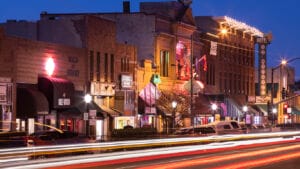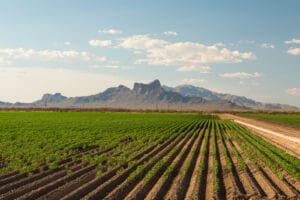A career in economic development is diverse and ever changing. It takes a high level of professionalism and communication, but also a little bit of expertise in a range of fields.
Some economic development professionals enter the field with a degree in something development-adjacent, land a successful internship or first job, and then find themselves directing a city or town’s growth. Not every path is so straightforward, however. Economic development doesn’t require a specific degree or a certain number of years doing a certain kind of training, leaders in the field come from many different backgrounds.
READ MORE: PTK spotlight: Arizona architects to know in 2026
DEEPER DIVE: Read the latest issue of PTK magazine
AZRE sat down with three of Arizona’s top economic development leaders to discuss how their backgrounds and experiences led them to the field, what advice they would give to young professionals and what skills are important for success in leading today’s cities and towns.

Jennifer Lindley
President of AAED and downtown development manager, Town of Queen Creek
AZRE: Can you tell us about your journey through higher education?
Jennifer Lindley: I graduated from ASU with a business administration degree and then got a little crazy and went back for a master’s degree in 2021. Funny story, I had to retake Econ 102 because I failed those courses several times. But that’s the interesting thing about this field — there isn’t a single track that works for everyone. I had a passion for community development and that’s what I’m doing today.
AZRE: How did you end up in the position you are now?
JL: I was blessed to start working at Intel as an intern. I stayed there for quite a while and had some great mentors that helped me take the leap into my second job at East Valley Partnership. It opened my eyes up to the broader world of economic development, then I transitioned into what I’m doing now, which is downtown development.
Before Queen Creek, I was in Downtown Chandler, where I focused on a micro area. When I applied for the Town of Queen Creek, I saw an opportunity to essentially build a downtown from scratch.
One of my favorite things about economic development is that it’s a marathon, not a sprint. Being able to see something from the beginning stages all the way to fruition is not only gratifying and rewarding, but also something that can be unusual in our field. Over the last 12 years at Queen Creek, I’ve been able to work on projects for years and watch them go from putting shovels in the ground to vertical. It’s fascinating and empowering.
AZRE: What advice would you give to young or emerging economic development leaders?
JL: Find a mentor and people that will support you. Use them as a sounding board, check in with them and make sure they’re checking in with you. It’s important for people looking into economic development to have resources and the ability to connect with people. I’d be happy to communicate with anybody interested in getting into the field and helping them develop a path.

Aric Bopp
Executive director of Discovery Oasis
AZRE: Can you tell us about your educational background?
Aric Bopp: I was fortunate and privileged to go to Johns Hopkins University, where I graduated with a degree in economics. Then, I went on to graduate school for economics at the University of Virginia. I’ve also studied through the International Economic Development Council and received my economic development certification 10 years ago.
AZRE: What was your first professional experience like, and what did it teach you?
AB: My first “real job” was with a technology company in Utah called DISC Publishing at the time. This was 25 years ago, when CD-ROM and digital technology was new and exciting. While I was there, I had lunch with someone who gave me a wonderful backhanded compliment. He said, “You know, you’re not that driven by money. You’d be good at economic development.”
At the time, I’d never heard about economic development as a profession but was curious about what he shared with me. So, I went and met with the local economic development developer for the city of Provo, Utah, and learned more about it, and was very intrigued by what they do.
AZRE: How did you eventually end up in Arizona?
AB: Being young, naive and egotistical, I decided to switch careers and become an economic developer. From there, I was lucky to be hired by a regional economic development group in Virginia. Ultimately, they made me the executive director at the age of 28, making me one of the youngest regional directors in the Commonwealth of Virginia. I did that for 12-plus years and really enjoyed it.
But as my oldest daughter was approaching high school age, my wife and I started thinking about where we wanted to spend the next chapter of our life. Thankfully, if you’re a successful economic developer, most communities have economic development programs.
I ended up going to the City of Mesa before being presented an opportunity to work at ASU as be the director of their economic development and innovation zones program. Honestly, I thought I would retire from ASU, because I loved the work and the people, but then this wonderful opportunity at Mayo Clinic presented itself.
Mayo Clinic, the most trusted name in healthcare, has brought things full circle with my career — having attended Johns Hopkins University — and I had always dreamed of being involved in the healthcare industry. Bringing together my passion for creating and improving the community is a dream come true.
AZRE: What would you share with young professionals considering a career in economic development?
AB: My advice to young people is that economic development is a great career that creates real lifelong relationships and opportunities. Most importantly, you can have a wonderful impact on your community and the people around you.

Armando Esparza
Director of economic development and government affairs, City of San Luis
AZRE: Can you tell us about your educational background?
Armando Esparza: I’m originally from San Luis, but I went to ASU to study urban planning. I’ve always been interested in how cities grow and develop. But at ASU, I realized that I didn’t really want to be in the planning space. So early on I learned about possible career paths, and during my junior year, I was looking through different internships and I landed one at the Greater Phoenix Economic Council.
AZRE: Did that first role set you on the path to economic development?
AE: Definitely. I didn’t even know economic development was a profession before that internship. Since then, I’ve worked in different roles, including at the Arizona Commerce Authority and the Small Business Development Center.
Eventually I decided to take a career break and go back to graduate school full-time for a master’s degree in public policy. That helped me figure out the level at which I wanted to work in economic development. I had done regional and state, but grad school showed me the impact you can have locally. That’s why I came back home to San Luis — to apply what I learned in Phoenix and use it here.
AZRE: Did you have any mentors or participate in programs that shaped your career?
AE: Yes, a big one for me was the Marvin Andrews and Jane Morris Fellowship through ASU’s School of Public Affairs. It exposed me to what good governance looks like and gave me a lot of mentorship opportunities. I worked closely with Cynthia Seelhammer, who was the longtime town manager at Queen Creek, and Kevin Phelps, the city manager of Glendale. I could always ask them about their experiences in local government and economic development, and I still apply those lessons today.
One thing I’ve learned is to always leave a good impression, because economic development is a small field. You never know when you’ll be working with someone again or needing their advice on a project.
AZRE: What advice would you give to young professionals looking to get into the economic development field?
AE: Even though I still see myself as a young professional, my advice is to understand why we do what we do. Yes, sometimes it’s about big companies and big projects, but at the end of the day it’s about bettering our communities through creating jobs for local families, attracting private investment and generating tax revenue that can be reinvested back into our towns and our people. At its core, economic development is about making sure our cities have a good quality of life and are great places to live.




